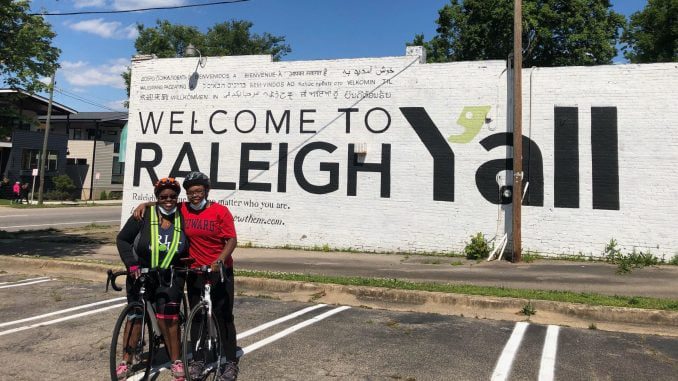
Wendy Morris was determined not to become housebound during the coronavirus pandemic that has sent so many people’s lives screeching to a halt.
So she decided to ride her bicycle from Asheville to Wrightsville Beach.
And the most amazing part of her accomplishment is that the Cary resident made the 475-mile trek from the mountains to the coast while spending her summer staying with family members in Montana.
That’s an awfully long distance to travel, especially from such a distance. But Morris and more than 5,500 other North Carolinians have been able to do it and stay active while traversing the state virtually as part of the Blue Ridge to the Beach Challenge.
“This was great because it got me out there regularly when I couldn’t go to the gym because of the coronavirus,” Morris, an avid cyclist and recreational triathlete, said. “We have a group where we keep track of each other’s progress and cheer each other on. It’s fun to be out there with other people, even if you can’t actually be out there with other people.”
While Morris has done most of her riding on the trails from afar, other weekend warriors have devised their own methods of getting from one end of the state to the other.
Barb Farrell, for one, puts her bike on the back of the car and drives to Oak Island, where the terrain is flatter and traffic lighter, to get her miles in, while Quintisha Forrester does her riding with members of her family on Durham’s American Tobacco Trail and Raleigh’s Neuse River Trail.
Others do their pedaling on stationary bikes or Pelotons. Some don’t ride at all — in addition to the bike challenge, there are also walk/run and cross-training challenges available.
“You can either walk, ride, run, swim, jog, roller skate, anything you want to do,” Farrell said. “You can sign up to do it any way you want.”
Farrell has already completed the challenge once and has made it all the way from Asheville to Shallotte on her second virtual trip across the state.
While the 475 miles sounds like a lot — it is, actually, no matter where you’re riding or walking — participants have six months to complete the journey. That comes out to about 18 miles per week, or just over two miles per day.
New challenges, called waves, begin every month. The event is currently on its fifth wave since starting up in May.
Finishers earn a medal and a T-shirt while accumulating badges along the way for every city they reach — Charlotte at Mile 117, Winston-Salem at Mile 200, Greensboro at Mile 230, Chapel Hill at Mile 278, Durham at Mile 290, Fayetteville at Mile 372 and Wilmington at Mile 465.
An interactive map is available so riders and runners can track their progress.
“It’s been really good for my whole family,” said Forrester, who along with her husband and 15-year-old daughter has made it as far as Fayetteville. “It’s good to know that there are other people with you trying to be healthy and you’re not out there alone.”
The Blue Ridge to the Beach Challenge came about as the result of a brainstorming session among the staff of Endurance magazine, said the publication’s publisher and founder Steve Lackey.
“We were looking for ways to motivate and inspire people, so we started with something a little less aggressive,” Lackey said. “We called it the Carolina Food Run. These were much shorter (events) with no map. People could choose anywhere from 30 to 120 miles in six weeks. And it was great. But it didn’t feel like it connected people as much as we wanted it to when you’re virtual.”
So Lackey and his staff went back to the drawing board looking to do something — in his words — a little more epic.
“We wanted to connect people with travel, and since you can’t really travel that easily right now, you can imagine being in these places and getting yourself there,” Lackey said. “Hopefully when things settle back down to what we used to feel was closer to normal, we can add some physical elements to these challenges. We’re really thrilled to see how exciting people are finding it.”
One real-life aspect that’s already associated with the Blue Ridge to the Beach Challenge is the charitable contributions it has made to local North Carolina food banks and hunger relief programs to benefit people struggling through the coronavirus pandemic.
Through entry fees and other donations, the event, combined with the previous Carolina Food Run, has already raised nearly $100,000.
“We pick local affiliates for each challenge,” Lackey said, “so that people feel like that the money they’re donating goes to where they live.”
The ability to help others in their time of need, however, is just one of the positive aspects that has come about through the Blue Ridge to the Beach Challenge.
Like Morris, it has become a source of motivation for many to get up and start moving again.
“The stories we’re hearing are remarkable,” Lackey said. “You hear people say, ‘I’ve lost 100 pounds in 12 months, I’m coming back from a battle with cancer,’ but we’ve also heard from people that contracted COVID earlier in the year and are using this to work through severe respiratory challenges.
“We have people from 50 states participating, people from other countries, but the majority of the people can relate to the route because they’re from Asheville, Greensboro, Raleigh, Fayetteville or Wilmington. This challenge has been great because it’s something you can feel connected to while you’re doing it.”
